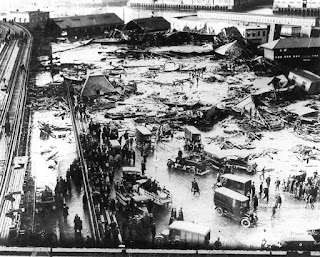Gibbons vs. Ogden: the Commerce Clause
 The United States Supreme Court case entitled Gibbons vs. Ogden is yet another vitally important case, it is also a complicated one. In 1808 the Legislature of New York granter Robert Livingston and Robert Fulton exclusive rights over all waters within the jurisdiction of the state. They started a ferry company that was successful for thirty years and had grown to have a similar contract with the Orleans Territory, essentially creating a monopoly.
The United States Supreme Court case entitled Gibbons vs. Ogden is yet another vitally important case, it is also a complicated one. In 1808 the Legislature of New York granter Robert Livingston and Robert Fulton exclusive rights over all waters within the jurisdiction of the state. They started a ferry company that was successful for thirty years and had grown to have a similar contract with the Orleans Territory, essentially creating a monopoly.  A man by the name of Aaron Ogden, a former New Jersey Governor, attempted to start his own ferry business, but was crushed by the existing monopoly. He ultimately decided to purchase a licence from Livingston and Fulton in 1815 and entered into business with a partner, Thomas Gibbons. Their partnership was unable to last three years, collapsing after Gibbons licensed and operated a steamboat on Ogden's rout between Elisabethtown, New Jersey and New York City (fun fact: Cornelius Vanderbilt was one of the ferry captain's). Although the monopoly supposedly had sole jurisdiction over the New York half of these waters, Gibbons was able to license the ferry under a 1793 Congressional law regulating coastal trade.
A man by the name of Aaron Ogden, a former New Jersey Governor, attempted to start his own ferry business, but was crushed by the existing monopoly. He ultimately decided to purchase a licence from Livingston and Fulton in 1815 and entered into business with a partner, Thomas Gibbons. Their partnership was unable to last three years, collapsing after Gibbons licensed and operated a steamboat on Ogden's rout between Elisabethtown, New Jersey and New York City (fun fact: Cornelius Vanderbilt was one of the ferry captain's). Although the monopoly supposedly had sole jurisdiction over the New York half of these waters, Gibbons was able to license the ferry under a 1793 Congressional law regulating coastal trade. It is safe to say that the partnership between these two men turned into the legal battle of a life time. Ogden ended up suing Gibbons and the case ultimately ended up being argued in the Supreme Court of the United States of America. Gibbon's lawyer, a young man and future super star by the name of Daniel Webster, argued that Congress had exclusive national power over interstate commerce according to Article I, Section 8, Clause 3 of the Constitution (aka the Commerce Clause).
It is safe to say that the partnership between these two men turned into the legal battle of a life time. Ogden ended up suing Gibbons and the case ultimately ended up being argued in the Supreme Court of the United States of America. Gibbon's lawyer, a young man and future super star by the name of Daniel Webster, argued that Congress had exclusive national power over interstate commerce according to Article I, Section 8, Clause 3 of the Constitution (aka the Commerce Clause).  As it turns out, this case was vitally important to national interest. It was heard in the early months of 1824, at the same point in time in which Congress was debating a bill that would provide a federal survey of roads and canals across the United States (it was passed as the General Survey Act in April of 1824). People across the country were concerned about the amount of power this would be able to give Congress, especially when it came to disputes in which the country was divided regionally, like on the issue of slavery.
As it turns out, this case was vitally important to national interest. It was heard in the early months of 1824, at the same point in time in which Congress was debating a bill that would provide a federal survey of roads and canals across the United States (it was passed as the General Survey Act in April of 1824). People across the country were concerned about the amount of power this would be able to give Congress, especially when it came to disputes in which the country was divided regionally, like on the issue of slavery.The holding of this case was as follows:
"New York law was invalid because the Commerce Clause of the Constitution designate power to Congress to regulate interstate commerce and the broad definition of commerce included navigation."
The Supreme Court ruled in favor of Gibbons, saying that Congress had the right to regulate interstate commerce. Since the ferry system crossed state lines the monopoly in which Livingston and Fulton had over the state of New York was inconsequential.
 Fast forward almost two hundred years and this decision still stands. To this day it is still one of the most important Supreme Court decisions in American history. The power of the federal government derives from Article I, Section 8 of the United States Constitution, making the Commerce Clause forever vital to American life.
Fast forward almost two hundred years and this decision still stands. To this day it is still one of the most important Supreme Court decisions in American history. The power of the federal government derives from Article I, Section 8 of the United States Constitution, making the Commerce Clause forever vital to American life.


Very interesting tbh more that i expected
ReplyDelete